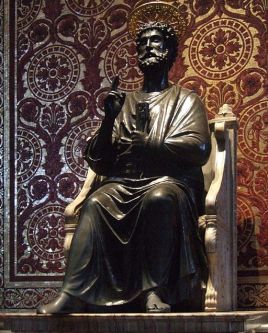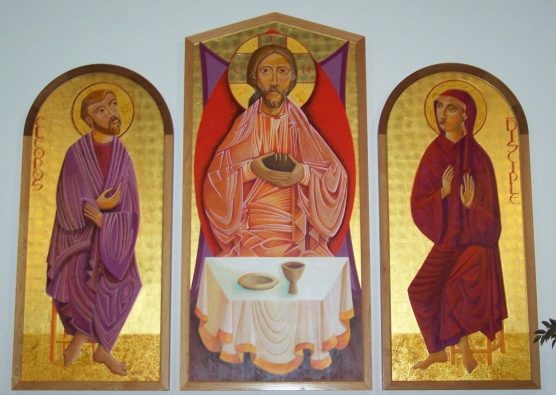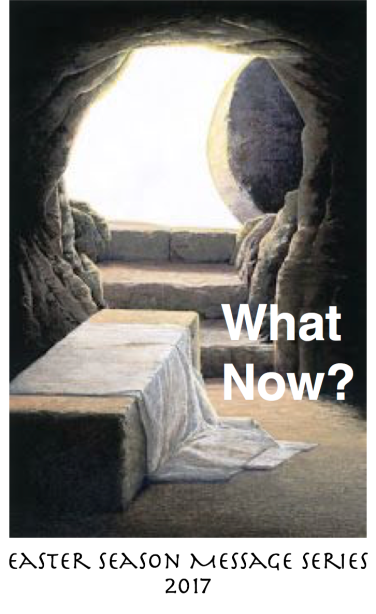This homily probably could have used some editing or “tightening up” but here’s how I preached the 21st Sunday of Ordinary Time in Cycle C of the Roman Catholic Lectionary this Sunday, more or less.
Reading Gospel of Matthew 16:13-20
I suspect most of us are familiar with the custom in St. Louis of asking someone you just meet for the first time “What high school did you go to?” The question confounds newcomers to St. Louis. Why would you want to know where I went to high school? Sociologists say the St. Louis question of what high school a person attended is a way of getting to know a person. The high school attended is an indicator of social status. If I know what high school you attended, I’ll have a clue if you come from a wealthy background or poorer. I’ll know a bit about your social status or if we have similar backgrounds. Supposedly, answering the question about your high school helps people negotiate what their relationship is going to be with that person.
Jesus asks a similar question in the gospel, today. When Jesus asks “Who do you say that I am” He’s not looking for some indication if the apostles know his name. When Jesus asks “Who do people say I am” he is asking what kind of relationship do they have with him. Adding a couple more words in the question would get closer to what Jesus is asking. “Who do you say I am ‘to you’? Or “Who do people say I am ‘for them’? Jesus is asking for a relationship status update. Jesus wants to know what is the disciple’s relationship to him is going to be.
Various answers are given by the disciples. Some say you’re a prophet, a kind of spiritual teacher They relate to you, Jesus, in a non-intimate way like a person looking for wisdom that you might give. But teachers can be dismissed as not knowing what they’re talking about. Teachers can be ignored.
Peter gets the right answer. “Jesus, you are savior for us!” What’s Peter saying? By knowing Jesus as the loving God who comes among the human race so humans can relate to him in a way that people just can’t with a “spiritual being” folks can have a relationship with a person that can even save humans from the forces that seek to wipe out human existence.
Jesus’ question, “But who do you say that I am?” is an invitation to enter into a relationship with Him. Jesus isn’t just someone to know stuff about, or a teacher that provides moral guidance about how to live a good life. Jesus wants to have a relationship with his followers that enables them to live through death. Christ, the name means “Savior,” wants humanity to relate to him like we relate to a spouse, a friend, or a lover who saves a person from being consumed with selfishness until there’s only a bitter old man or woman without love in their life, unable to experience love or enjoy life fully.
Relationships are a two-way street. Both parties in a relationship have to figure out who the other person is to them. It could be best friend. This person might be the love of my life. It might be helpful to understand the Gospel of Jesus asking who people say he is if we’d flip the question around. Who are we “to Jesus”? Who does Jesus say we are, sitting in these pews? Who does Jesus say the rest of the inhabitants of this planet are to him; anyone who has lived, lives or every will live on this insignificant rock perfectly positioned in a not too far, not too close orbit around a star in a remote corner of the universe? We are the beloved human race he called into being so that he could have someone to love and became one of. We humans are the creatures Jesus loves like no other created being, so much so that he deems us worthy of saving from death. We are the beloved bride of the groom Christ who can not stand the thought of ever being separated from. So loved are we as individuals and a race that Christ desired us from before time began to live with him and be like him even when we allowed death to invade the beauty of life. Who does Jesus say we are? The Word of the Creator God says humanity is the love of his life worthy of salvation even when they betray the relationship He wants with men and women through their sinful acts that weaken the relationship like adultery is to marriage. Relationships are a two-way street. To understand who Jesus is to us, it’s helpful to know who we are to Jesus. We are the beloved spouse he wedded himself to in the incarnation, so that he might save his us from death in order to live in his house, forever beyond the limits of space and time.
When the Gospel author Matthew has Jesus say to Peter you are the rock, the solid foundation on which Christ will “build” his church Matthew is saying the Church makes possible the relationship with Jesus. Peter is not being made Pope in that instant. Peter becomes the symbol of authentic faith. His statement is raised up by Christ as the foundational truth on which the church stakes humanity’s fate. The church is the Body of Christ. Matthew, the writer, is teaching the community he wrote his Gospel account for that the church is the human vessel that makes possible the relationship with Jesus that saves from death. Peter is a symbol of the Church. The relationship description Peter voices is the rock, the solid foundation of the truth proclaimed by the Church throughout the ages. The role of the church is to hand on generation to generation through sacraments, preaching and catechesis a relationship with Christ that saves from death. Outside of the rock solid relationship Jesus offers through His body, the church (which is safeguarded by the successors of Peter, the Pope and the leadership of the church in union with the Holy Father) there is no hope of living after death.
The author Brian Doyle, when asked why he is Catholic once wrote how the Church had helped him to be in relationship with Jesus as savior and saved. Mr. Doyle wrote about the authentic faith handed onto him by the Church represented by Peter,
“Sometimes I desperately need to lean on a god wiser and gentler than myself. Sometimes I desperately need to believe that when I die I will not be sentenced to Fimbul, the hell winter, where there is only the cold voice of Nothing, but rather I will be at peace and draped in Light. Sometimes I am nudged toward belief by the incredible persistence and eerie genius of the tale [handed on by the Church’s Gospel]: the encompassing love of the mother, the wordless strength of the Father, the Lord of All Worlds cast ashore on this one as a mewling child in dirty straw. Sometimes I am moved past reason by the muscular poetry and subtle magic of these [Gospel] stories. Sometimes it is an intuitive yes as the light fails and the world is lit from below. And sometimes I simply cast my lot with the sheer bravura of such a patently brazen lie. That a man could die and live again is ridiculous; even a child knows that death is the end. Or is it?”
Doyle, Brian. Leaping: Revelations & Epiphanies (p. 80). Loyola Press. Kindle Edition.

Statue of St. Peter in St. Peter’s Basilica, Rome. Possibly the work of Atnolfo di Cambio. Thought by some historians to be much older. This work has been released into the public domain by its author, Mattis. This applies worldwide. Via commons.wikimedia.org
The author of this quote recently died in middle age of a brain tumor. Family and friends say he died at peace, knowing his relationship with Christ as savior was the rock that would break the power of death, the key that would open the door of his house in eternal life.
Don’t just see Jesus as one of many gurus that offer wisdom or moral teaching for a happy life in this world as some do. Do not delay! With the assistance of the Church, through its sacraments, preaching and catechesis, fall in love with Jesus, the one who saves and who loves you to death…and beyond.















You must be logged in to post a comment.